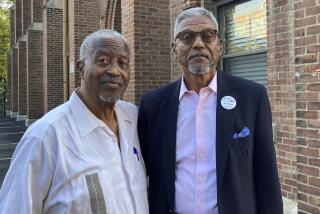Gulf Veterans Air Beliefs on Chemical War
- Share via
WASHINGTON — Dozens of Persian Gulf veterans, complaining of bouts with cancer, dizziness, soreness, swelling and other unexplainable ailments, urged Congress on Tuesday to push the Pentagon to acknowledge that U.S. troops were exposed to chemical agents during Operation Desert Storm.
About 50 ailing veterans--including one in a wheelchair, several with canes and two who have lost their hair--appeared at a special session of the House Veterans’ Affairs Committee to discuss their medical problems. Overflowing the small hearing room, they embraced one another and sometimes cried, overcome with anger and pain and feelings that the government they fought for has forgotten them.
Army Col. Herb Smith of Frederick, Md., barely able to walk to and from his seat at the witness table, was on short leave from the Walter Reed Army Medical Center.
Mike Land, a Blackhawk helicopter pilot from Huntington Beach, Calif., described how doctors discovered a golf-ball-size tumor in his lymph node and how his wife is beginning to suffer pains in her joints and their daughter was born with deformed feet.
Hester Adcock of Ocala, Fla., told the story of her son, Michael--once a championship weightlifter and boxer--who developed cancer of the heart, lungs, spleen, kidney and brain and died 11 months after he came home from Saudi Arabia.
The Pentagon has officially denied that any American troops were exposed to chemical or biological agents. But Defense Department officials have scheduled two briefings for today to clarify their position and explain what is being done to help sick veterans.
They also are claiming that only about 250 of the half-million U.S. service members who were dispatched to the Persian Gulf have experienced symptoms that military and VA physicians still cannot accurately diagnose.
But veterans support groups and several sympathetic House members said the number of ill soldiers has risen into the thousands.
Complicating the problem, they contended, the Pentagon has been less than forthcoming in detailing the possible health risks that U.S. troops confronted during the war. They cited as an example a report by a Czechoslovakian chemical agent detection team that found evidence of toxic contamination. The Pentagon has asserted that the reported contamination did not affect U.S. troops.
The most dramatic testimony came from Carol Picou, an Army nurse from San Antonio, and Carl May, an Army reservist from Philadelphia.
Picou said she had experienced urinary and bowel incontinence, rashes, hair loss, nausea, dizziness and fatigue.
May has suffered many of the same conditions but is no longer mobile. Wheeled up to the witness table, he could barely start speaking before he broke down into sobs.
More to Read
Sign up for Essential California
The most important California stories and recommendations in your inbox every morning.
You may occasionally receive promotional content from the Los Angeles Times.













